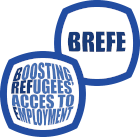Testimonies
Three types of testimonies are presented: stories of refugees, integration paths seen from the professionals' point of view and initiatives told by the people who implement them. They show that a successful professional integration requires the joint involvement of several actors. They can be accessed either directly or by keywords.
Volunteering to accelerate integration, in addition to taking advantage of the various opportunities to learn the language
"When I arrived in France with my husband and son, I was pregnant. I only knew a few words of French : "hello, goodbye, thank you, I don't understand". I had studied music in Georgia. I had worked for 11 years as a teacher in music school and in primary school for singing lessons. As soon as I arrived in France, I wanted to take courses to speak French. It started at the Restos du cœur and then, when we went to the centre for asylum seekers, I took another course.
As my son went to school, I looked at his homework and I also learned like that by following his school work. I also watched a lot of French TV. When we went to the French Administration for Immigration and Integration to sign the contract of reception and integration, we were sent to the Greta to take French courses.
I did the mandatory training and passed the Diploma of French Language Studies (DELF) Level A1. I continued with the DELF Level A2 again thanks to the Administration for Immigration. Then I followed a 600-hour training course with the job centre. It really helped me a lot.
Learning the language has opened up doors for me. I was able to talk, to explain what I needed. Knowing French has helped me a lot. I could express myself, say what I think. Here people think freely, you shouldn't be afraid to talk. We must not be discouraged because sometimes it is difficult. Getting out of the house, being in contact with others and not staying with the people of your country. Being in contact with the social worker of the centre for asylum seekers was also important. I had always been very active and I really wanted to work. I wanted to continue to work in the field of music as a teacher. I had to find something to do, even on a voluntary basis. After the birth of my second son, I volunteered at the nursery but also in the church for music festivals. I play an instrument from my country. Thanks to the crèche I was spotted by a staff member from the municipality to participate in the baby shower and play music. I also play for neighbourhood parties, and with the symphony orchestra of the music conservatory. I sing in a choir as a soloist. One day I was offered a replacement at the conservatory as a piano teacher, then music theory lessons in the surrounding cities, as well as musical initiation too. Since then I've even been doing replacements for the choir, I do a lot of replacements.
In France, there are many social benefits, especially in terms of health. I was well cared for in the maternity hospital for the birth of our second child. Women have more rights here. But I can say that the mentalities are similar to those of my country, they are quite similar. We have the same religious holidays. Besides, I lived in a small town like this one.
My son has adapted very well.
Last year I followed a training course financed by the Immigration Bureau to validate a B1 level and I was able to apply for naturalisation. I am very happy to be here.”

Overcoming language barrier and lack of competences
Seedy arrived in Spain in 2009, when the financial crisis flared up. With the restrictive Spanish laws, his legal status could not be regularized until the end of 2018, so he had to perform hard and poorly paid jobs on the black market. In these jobs he did not have the opportunity to learn Spanish properly. Because social services referred Seedy to SSF's employment services, he began an intervention pathway that focused on acquiring transversal and key skills to adapt to the needs of the Spanish labour market, given that he had no studies in Gambia. But the main problem was the lack of mastery of Spanish. Seedy followed a double itinerary: while he was acquiring the necessary skills to work, he also improved his level of Spanish in the services provided by SSF. This has allowed him to obtain a contract as a warehouse waiter in a supermarket. Now, Seedy continues to attend SSF's employment services, his level of Spanish is improving day by day thanks to the combination of the Spanish course and on-the-job regular use. Finally, he can feel more integrated and respected in society.

